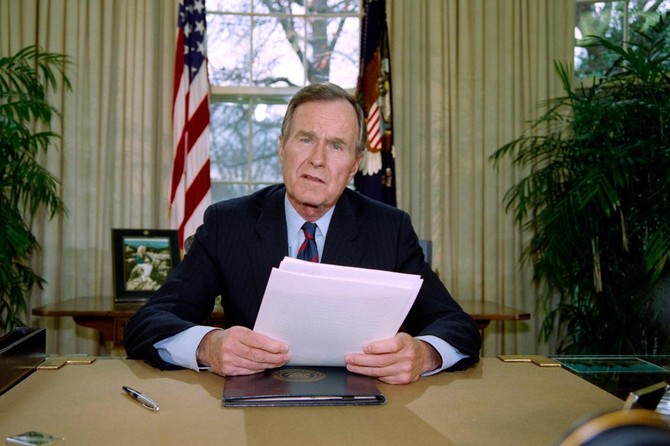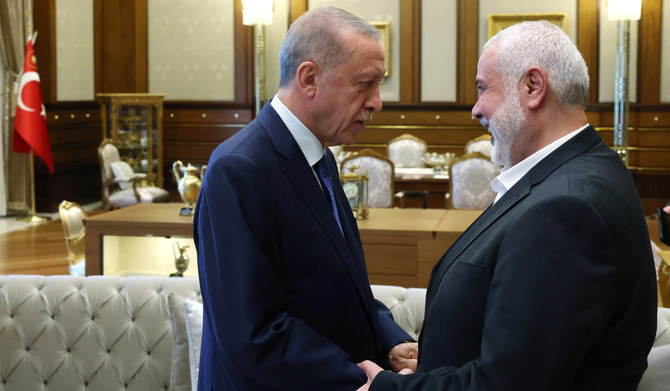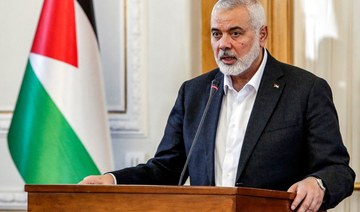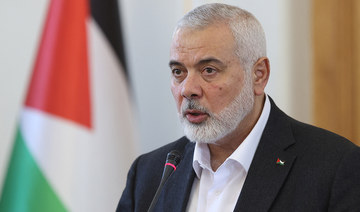JEDDAH/LONDON: Gulf Arab states have offered their condolences over the death of former President George H.W. Bush.
Bush’s death at the age of 94 takes on greater importance in the region over his actions in the 1991 Gulf War that saw Iraq expelled from Kuwait.
Leaders in the United Arab Emirates on Saturday offered condolences to both President Donald Trump and former President George W. Bush for the elder Bush’s death.
Dubai’s ruler Sheikh Mohammed bin Rashid Al Maktoum, who also is the UAE’s prime minister and vice president, tweeted that Emiratis remember Bush as “a firm ally and friend.”
Our condolences to the Bush family and to the American people on the passing of George H.W. Bush, who we remember as a firm ally and friend..
— HH Sheikh Mohammed (@HHShkMohd) December 1, 2018
Oman’s Sultan Qaboos bin Said similarly offered condolences.
Kuwait's ruling Emir Sheikh Sabah Al-Ahmad Al-Sabah said that Bush tried to "create a new international order based on justice and equality among nations,” and that his support "will remain in Kuwait's collective memory and will not be forgotten."

In a letter to US President Donald Trump, Al Sabah praised Bush's "historic and courageous stance... and his rejection of Iraq's occupation of Kuwait from the early hours".
"On behalf of the Kuwaiti government and people, I express my deepest condolences and utmost sympathy."
Former US president George H.W. Bush, who guided America through the end of the Cold War and launched the international campaign to drive Iraqi strongman Saddam Hussein’s forces from Kuwait, died Friday at his home in Houston.
Tributes quickly poured in for the 41st US president — a decorated World War II pilot, skilled diplomat and onetime CIA chief who also saw his son George follow in his footsteps to the Oval Office.
His time in office was praised for helping to maintain stability during the fall of the Iron Curtain and the collapse of the Soviet Union.
Another foreign policy success was his handling of the 1991 Gulf War. He led a strong international campaign to drive Iraqi President Saddam Hussein’s forces out of Kuwait. He devoted much of his time to foreign affairs, approached it with his characteristic conservatism and pragmatism. Arab countries led by Saudi Arabia joined the US to form a coalition articulating the four principles that guided “Operation Desert Shield.”
“I extend my sincerest condolences to the Bush family and to the American people upon the passing of the 41st President of the United States, George H.W. Bush. May he Rest in Peace,” said Saudi Ambassador to the US Prince Khalid bin Salman.
Kuwait’s ruling Emir Sheikh Sabah Al-Ahmad Al-Sabah said that Bush tried to “create a new international order based on justice and equality among nations,” and that he never “forgot the Kuwaiti people and will remain in their memory.”
“It is not a surprise that the late President George H.W. Bush is being remembered so fondly today by many people in Saudi Arabia, Kuwait and elsewhere in the region. His resolve and resoluteness during the Gulf War is still regarded by many in the US and in the international community as the penultimate example of steady leadership during a time of crisis,” Fahad Nazer, a fellow with the National Council on US Arab Relations, told Arab News.
The decisiveness and moral clarity that President Bush and the late King Fahd of Saudi Arabia demonstrated during the crisis has set a high bar for other world leaders, he said.
“In some ways, both President Bush and King Fahd’s legacies were forged during the crisis; President Bush for his commitment to maintaining international order and King Fahd for demonstrating in both words and actions, his solidarity with Kuwait during its most difficult chapter,” Nazer said.
Bush’s passing comes just months after the death in April of his wife Barbara — his “most beloved woman in the world” — to whom he was married for 73 years.
“Jeb, Neil, Marvin, Doro and I are saddened to announce that after 94 remarkable years, our dear Dad has died,” former president George W. Bush said in a statement.
Bush is survived by his five living children -a sixth child, daughter Robin, died of leukemia before her fourth birthday — and 17 grandchildren.
He died “at home in Houston surrounded by family and close friends,” family spokesman Jim McGrath told AFP.
Bush suffered from Parkinson’s disease and had used a wheelchair for several years. He had been in and out of hospital in recent months.
Funeral arrangements will be announced in due course, McGrath said.
The former president, a Republican, is expected to lie in state in the US Capitol and then be buried at his presidential library in Texas, where students held a candlelight vigil early Saturday, local media reported.



























